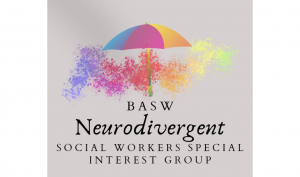Neurodistinct social workers need allyship

Published by Professional Social Work magazine, 14 March, 2023
Neurodiversity, as a term, is becoming more widely used, yet not without danger of being misunderstood, oversimplified, or undermined.
It is important to acknowledge what it stands for, with the most obvious recognition that all humans are complex beings. In all our complexity, our minds function differently; more importantly, there is no one ‘right’ way. As the autistic writer and educator Dr Nick Walker clarifies, there cannot be one ‘normal’ or ‘healthy’ type of brain or neurocognitive functioning in the same way there is no one ‘healthy’ or ‘normal’ ethnicity, gender, or culture.
Perhaps, when we come across the much-favoured ‘normal’, we should ask ourselves (and others) who has the authority to define what ‘normal’ is for the context in question?
The main difficulty comes from our inherent need to apply value to one person over another. This is commonly seen in ableism or discrimination in favour of able-bodied people. Confronting internalised ableism is difficult when practitioners attempt to promote an inclusive ethos while perpetuating ableist language.
Therefore, developing a culturally conscious approach to engaging with others while seeking to explore shared meaning and understanding in our daily practice matters. Starting with our own knowledge base, while continuously challenging our own assumptions and biases, makes our empathy visible. When this is embedded systemically within organisational culture and practice we stand a chance of more authentic, core anti-oppressive practice inside and outside of our organisations.
Neurodivergent or neurodistinct social workers have some impressive strengths; the ability to connect with trauma, identify patterns, analyse detail, solve problems, seeing beyond the ‘norm’ to identify creative solutions. Fitting neatly ‘into boxes’ is not our forte as we tend to overlap, rarely seeking social hierarchies or competition with others, and we are open and honest. All these strengths will shine if they can be channelled; they may excel when met with an open mind, acceptance and support.
The willingness of managers and colleagues to learn and recognise pressures and triggers that lead to debilitating overwhelm and discomfort can add significantly to a conducive and more productive work environment.
Solutions are often very simple and inexpensive, starting with understanding the other’s differences. So, next time you walk into the room, think about the lighting. Is the room too bright? What is the noise level? Could wearing headphones help to maintain focus and manage that sense of overload?
Checking in with colleagues and asking what helps create a more inclusive environment minimises segregation, isolation, and potential burnout. By being observant and supportive of colleagues’ needs, perhaps linking to particularly intensive periods at work and reminding them to have a break, you can model self-care in your team. And never underestimate the power of the ‘quiet space’! Remember, small changes can offer huge outcomes that benefit everybody. You hold the power to consider and adapt some key working practices in your service without compromising standards. Is it time to dismantle assumptions about that one ‘best’ way for all?
As social workers, we pledge commitment to strengths and relationship-based practice with value-laden approaches embedded in working with people. We tend to forget that social workers themselves happen to be human. We should aim to lead by example through our work with each other and by championing our colleagues and friends alongside those that we support.
Neurodistinctiveness is for life and not just for the celebration week. This year’s Social Work Day celebration calls for ‘Respecting Diversity Through Joint Social Action’: an invitation for us all to go beyond a day, a week, an event, or a training session. Neurodistinct social workers exist, we need allyship and commitment to change a profession we belong in.
BASW Neurodivergent Social Workers Special Interest Group welcomes all colleagues to join regular meetings. Come and share your ideas and practice. Contact Helen.Randle@basw.co.uk
* The other authors of this article are Deb Solomon, Jenni McCabe, Sandy Symonds, Aga Buckley and David Grimm
